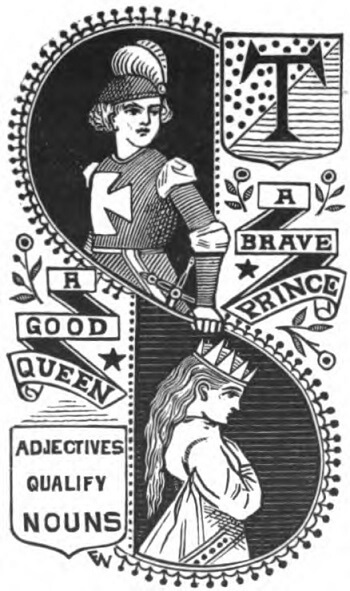Activity - Week 1: Identify the Adjectives
Identify the adjectives in the Judge's story so they can be struck out.
- A long, long time ago, there lived in a grey old castle, a widowed queen, who had one only child, a beautiful bright boy.
- 'My good husband was killed in the terrible war,' said the grieving queen, 'and if my dear son grows up to be a fighting man, I fear that he will go to the cruel wars, too, and be killed.
- 'So he shall learn nothing about rough war, but shall be brought up to stay safe at home with me forever.'
- So she taught him that home was better than the outside world, and she thought he was too quiet to wish to go to war; but one day there came to the great castle gate a noble knight riding a gallant charger.
- 'Come,' he cried to the young prince, 'come, follow me. I ride to fight with the wicked and strong who are oppressing the weak and the poor.'
- Up sprang, in a moment, the fair young boy, flung aside his quiet and safe work, seized his father's battered sword, and leaped into the saddle behind the noble knight.
- 'Farewell, dear mother,' he cried, 'no more staying home for me.
- 'I must be a brave man, as my father was, and conquer or die in the rightful cause.'
- Then the queen saw that it was useless to try to keep her adventurous son from the world.
Activity - Week 2: Play Adjective Games
Game 1: With your instructor and fellow students, play the 'I See Something,' adjective game.
- The person who is 'it' will select a visible object in the room and use only adjectives (e.g. size, color, shape, etc.) to describe it.
- The one who guesses the object first correctly wins.
- Repeat so that each student gets a turn as 'it.'
Game 2: With your instructor and fellow students, play the 'Which Animal?' adjective game.
- The person who is 'it' will select an animal and use only adjectives (e.g. size, color, shape, etc.) to describe it.
- The one who guesses the animal first correctly wins.
- Repeat so that each student gets a turn as 'it.'
 Grammar-Land
Grammar-Land
Grammar-Land
Grammar-Land


 Grammar-Land
Grammar-Land
Grammar-Land
Grammar-Land
